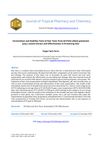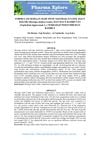 December 2022 in “Journal of Tropical Pharmacy and Chemistry”
December 2022 in “Journal of Tropical Pharmacy and Chemistry” The hair tonic made from oil palm leaf extract is very effective in preventing hair damage from the sun.
 4 citations,
August 2022 in “The Scientific World Journal”
4 citations,
August 2022 in “The Scientific World Journal” Merremia peltata leaf extract, particularly the bufotalinin compound, shows potential for treating hair loss.
May 2024 in “Pharmacia/Farmaciâ” Purple sweet potato leaf extracts can help treat hair loss and fungal infections.
 November 2024 in “Clinical Cosmetic and Investigational Dermatology”
November 2024 in “Clinical Cosmetic and Investigational Dermatology” Rosemary oil may effectively treat hair loss with fewer side effects, but more research is needed.
 24 citations,
January 2020 in “International Journal of Molecular Sciences”
24 citations,
January 2020 in “International Journal of Molecular Sciences” Some plants with flavonoids may help treat hair loss and promote hair growth.
 March 2024 in “International Research Journal Of Modernization In Engineering Technology And Science”
March 2024 in “International Research Journal Of Modernization In Engineering Technology And Science” Certain plants like Aloe vera and Neem are effective and safe for treating various skin conditions.
 8 citations,
September 2016 in “Asian journal of beauty & cosmetology”
8 citations,
September 2016 in “Asian journal of beauty & cosmetology” Dendropanax morbifera leaf extract could be good for hair growth and cosmetic products because of its antioxidant properties and growth factor effects.
 August 2021 in “Journal of Fundamental and Applied Pharmaceutical Science”
August 2021 in “Journal of Fundamental and Applied Pharmaceutical Science” Black tea extract at 5% concentration promotes the most hair growth.
 19 citations,
August 2010 in “Journal der Deutschen Dermatologischen Gesellschaft”
19 citations,
August 2010 in “Journal der Deutschen Dermatologischen Gesellschaft” Certain plant extracts can effectively treat skin conditions like athlete's foot, chronic vein problems, sun damage, skin growths, vitiligo, and hair loss, and may also improve skin appearance.
 May 2023 in “Pharma xplore : jurnal sains dan ilmu farmasi”
May 2023 in “Pharma xplore : jurnal sains dan ilmu farmasi” Hair tonic with equal parts Moringa and rambutan leaf extracts grew rabbit hair longer and heavier than the control product.
 8 citations,
February 2022 in “Molecules”
8 citations,
February 2022 in “Molecules” Asparagus racemosus root extract reduced sebum and pore size in men but not in women.

Hair RiseTM microemulsion effectively promotes hair growth and treats hair loss better than standard treatments.
 September 2024 in “International Journal of Molecular Sciences”
September 2024 in “International Journal of Molecular Sciences” Hydrangea serrata extract may promote hair growth and improve hair health.

Nanocarriers with plant extracts show promise for safe and effective hair growth treatment.
 11 citations,
December 2020 in “Notulae botanicae Horti Agrobotanici Cluj-Napoca”
11 citations,
December 2020 in “Notulae botanicae Horti Agrobotanici Cluj-Napoca” Mycorrhizal fungi and shading improve tea plant growth and nutrient uptake by changing hormone levels and gene expression.
 3 citations,
January 2018 in “Chiang Mai University Journal”
3 citations,
January 2018 in “Chiang Mai University Journal” Centella asiatica extract may help promote hair growth.
 5 citations,
January 2016 in “Asian pacific Journal of Tropical Biomedicine”
5 citations,
January 2016 in “Asian pacific Journal of Tropical Biomedicine” Phthirusa pyrifolia extract may lower testosterone and harm male rat reproduction without damaging the liver or kidneys.
1 citations,
May 2019 in “International Journal of Applied Pharmaceutics” Both hair tonic and gel with Angiopteris evecta extract effectively stimulate hair growth.
 August 2024 in “Applied Sciences”
August 2024 in “Applied Sciences” Plant extracts may help prevent or reverse hair graying.
 1 citations,
November 2021 in “Jurnal Farmasi Indonesia”
1 citations,
November 2021 in “Jurnal Farmasi Indonesia” Secang wood extract hair tonic promotes hair growth and meets quality standards.
 25 citations,
July 2017 in “Archives of Dermatological Research”
25 citations,
July 2017 in “Archives of Dermatological Research” Herbal products might promote hair growth with fewer side effects, but more research is needed to confirm their safety and effectiveness.
 41 citations,
July 2015 in “Current Drug Discovery Technologies”
41 citations,
July 2015 in “Current Drug Discovery Technologies” Some plants may help with hair growth and have fewer side effects than synthetic drugs, but more research is needed to confirm their effectiveness.
 January 2024 in “Journal of applied biological chemistry”
January 2024 in “Journal of applied biological chemistry” Glehnia littoralis and Andrographis paniculata extracts can significantly boost hair growth.
 434 citations,
October 2003 in “PTR. Phytotherapy research/Phytotherapy research”
434 citations,
October 2003 in “PTR. Phytotherapy research/Phytotherapy research” Natural products in cosmetics are beneficial for skin and hair care with low toxicity.
 81 citations,
June 2010 in “Journal of Dermatological Treatment”
81 citations,
June 2010 in “Journal of Dermatological Treatment” The document concludes that minoxidil and finasteride are proven for hair growth, herbal remedies show promise, but more research is needed to confirm their effectiveness.
 1 citations,
February 2017 in “Journal of pharmacology & clinical research”
1 citations,
February 2017 in “Journal of pharmacology & clinical research” The herbal hair gel with Eclipta alba and Lippia nodiflora extracts was more effective at growing hair than the control gel and minoxidil.
February 2024 in “Cosmetics” The conclusion is that new plant-based treatments for hair loss may work by targeting certain enzymes.
11 citations,
December 2020 in “Advanced structured materials” Natural products like coconut oil and aloe vera are beneficial in cosmetics for their healing properties.
 1 citations,
January 2016 in “Springer briefs in molecular science”
1 citations,
January 2016 in “Springer briefs in molecular science” I'm sorry, but there's no information provided for me to summarize.
24 citations,
March 2020 in “Cells” Natural small molecules can help treat diseases by activating or inhibiting the Wnt pathway.

























